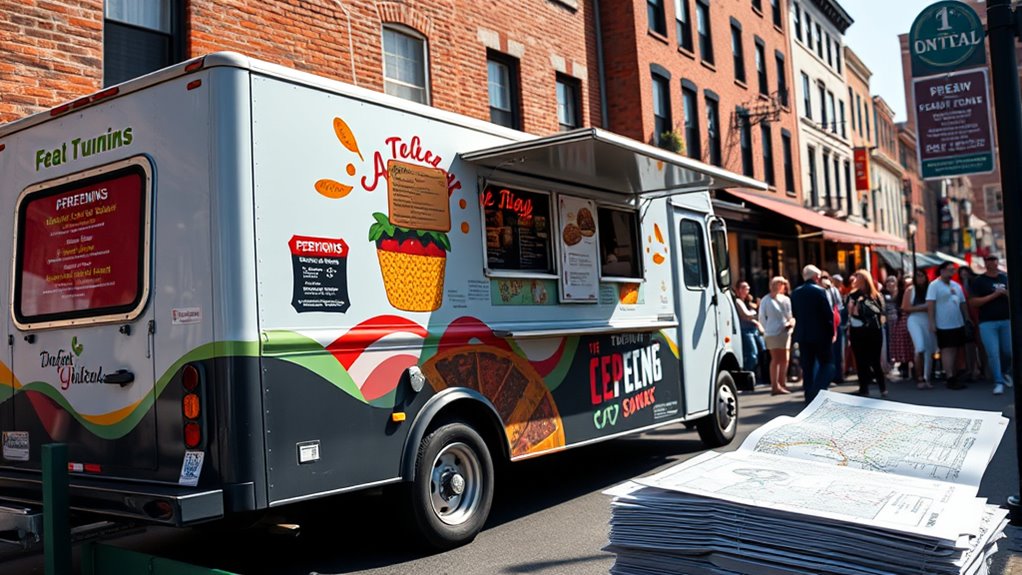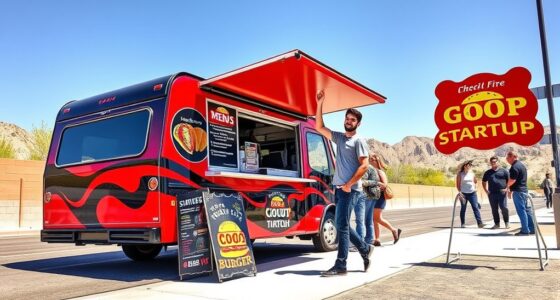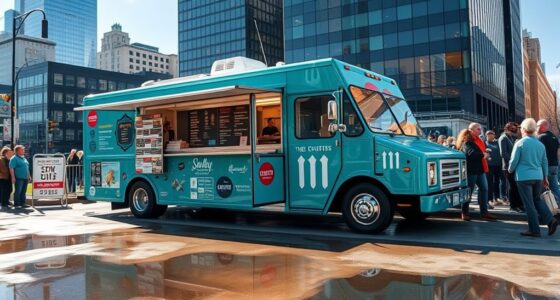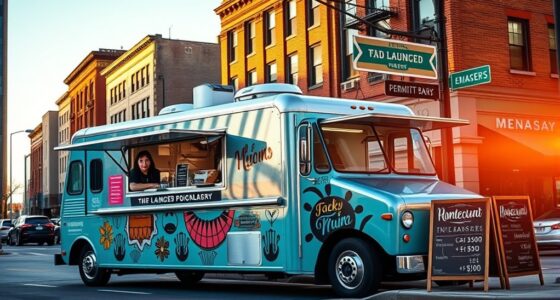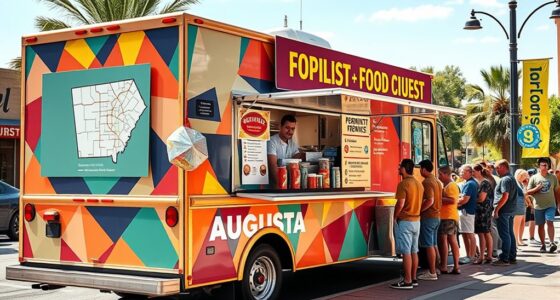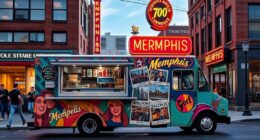To open a food truck in Trenton, NJ, you’ll need to secure permits like health, vendor, and parking licenses, with costs ranging from $30 to $500. Register your business and obtain insurance, then choose high-traffic locations like downtown, parks, or events. Plan a compliant menu and develop a marketing strategy using social media, community events, and branding. Keep detailed records to guarantee smooth operations; explore the next steps to set your mobile business apart.
Key Takeaways
- Obtain necessary permits, including mobile food vendor, zoning, parking, and health inspections, with costs ranging from $30 to $500.
- Choose a legal structure (LLC or sole proprietorship), register the business, and acquire an EIN for tax compliance.
- Target high-traffic locations like downtown, parks, festivals, and college campuses for maximum visibility and customer flow.
- Develop a compliant menu with food safety protocols, allergen labeling, and appealing presentation to attract modern consumers.
- Use branding, social media, community events, and local partnerships to effectively market your food truck and build a loyal customer base.
Understanding the Legal Structure and Registration Process in Trenton

To start your food truck business in Trenton, understanding the legal structures and registration steps is vital. You can choose from several options, like a sole proprietorship, which is simple but makes you personally liable. An LLC offers liability protection and is popular among food truck owners. Partnerships allow shared management, while corporations provide stronger liability shields but involve more regulation. When registering, sole proprietors and partnerships must file their trade names locally, but other structures register with the NJ Division of Revenue and Enterprise Services (DORES). You’ll also need an EIN from the IRS for taxes and hiring. Additionally, registering for New Jersey state taxes and securing the appropriate permits and insurance are essential steps. Registering your business correctly can help prevent legal issues later on. Proper registration ensures legal compliance and smooth operation for your food truck business, especially considering the various business registration requirements in New Jersey.
Navigating Permits and Licensing Fees for Food Trucks in Trenton

Navigating permits and licensing fees in Trenton requires you to understand the specific requirements set by the city’s regulations. First, you’ll need a vendor license, which varies depending on your operation and may involve multiple licenses if working in different areas. Applications and fee schedules are accessible through municipal offices or online. You’ll also need a mobile food vendor permit, which guarantees compliance with health and safety standards, including inspections of kitchen facilities, sanitation, and propane storage. Zoning and parking permits are essential for legal operation and can cost between $30 and $500, depending on location and duration. Additionally, your truck must be registered with the New Jersey Motor Vehicle Commission, and you’ll need proper insurance and safety permits, including fire safety certificates. These layered permits are vital before launching your food truck in Trenton. Understanding local ordinances and restrictions can help prevent fines or shutdowns. Ensuring you are aware of municipal regulations can facilitate a smoother permitting process and avoid potential legal issues.
Choosing Prime Locations and Parking Options in Trenton
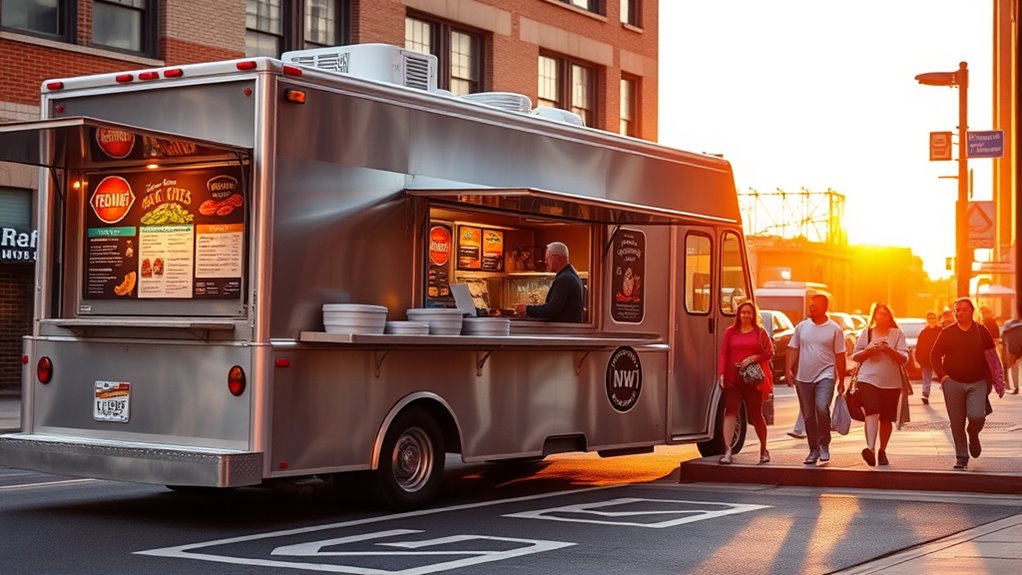
Choosing the right locations and parking options can make or break your food truck’s success in Trenton. Focus on high-traffic downtown areas with lots of pedestrian and vehicle activity—near government buildings, offices, and business districts where workers seek quick meals. College campuses, vocational schools, parks, and public event spaces also attract lunchtime crowds and festival-goers. Research municipal regulations to find designated parking spots or city-owned lots with permits, avoiding residential zones with restrictive laws. Look for recurring community events like farmers markets and festivals, as well as collaborations with sports venues and theaters. Prioritize locations with ample space for maneuvering, customer queues, and nearby utilities, ensuring safe pedestrian access and security for evening hours. Keep an eye on local competition and market trends to stay ahead. Securing appropriate permits and understanding local ordinances is essential to avoid fines and ensure smooth operations. Additionally, exploring options in nearby cultural and entertainment districts can boost visibility and foot traffic for your food truck.
Planning a Menu That Complies With Local Health Standards
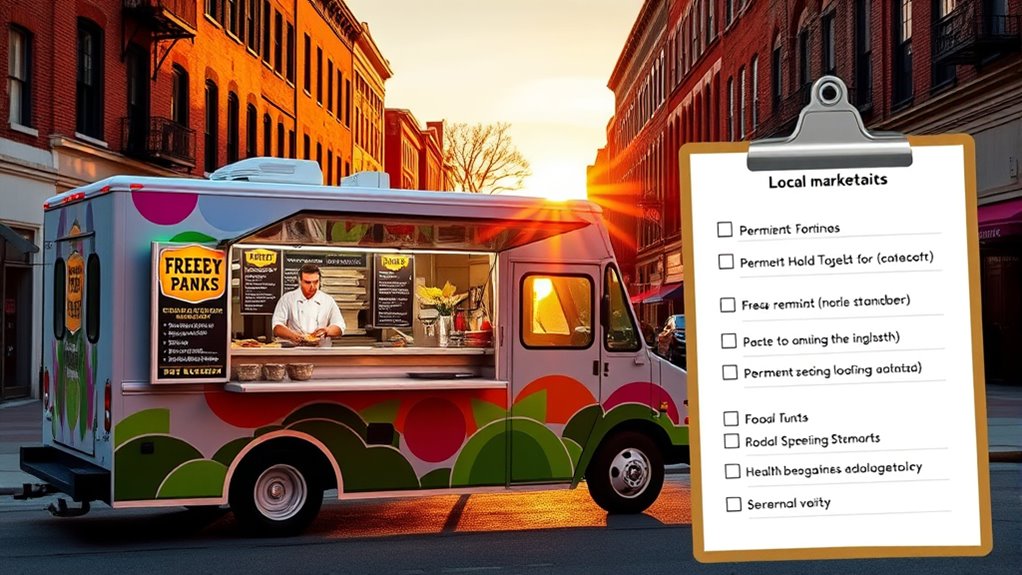
When planning your menu, you need to follow New Jersey’s food regulations to guarantee safety and compliance. This means selecting ingredients and preparation methods that meet sanitation standards and prevent cross-contamination. By understanding local rules, you can create a menu that’s both appealing and legally sound. Additionally, ensuring your menu offers proper color accuracy can help in presenting your dishes attractively and accurately to customers.
Local Food Regulations
Are you aware of the specific local health regulations that impact your food truck menu in Trenton? You must ensure your ingredients meet New Jersey’s allergen labeling laws, clearly disclosing peanuts, dairy, gluten, and other common allergens. Use locally sourced ingredients only if they meet safety standards and origin transparency. Menus with raw or undercooked foods need consumer advisories, and all descriptions must be accurate to prevent misleading customers. Additionally, any menu changes require updates to your food safety plans and approval during inspections. Being familiar with food safety standards can help you maintain compliance and protect your customers.
Safe Food Preparation
Planning a menu that complies with local health standards starts with selecting ingredients and preparation methods that prioritize safety. Use only approved ingredients from trusted suppliers, and avoid hazardous foods that require complex handling. Design your menu with items that minimize cross-contamination risks by limiting raw ingredients and avoiding intricate preparation steps. Stick to recipes that can be cooked and stored at proper temperatures—below 41°F for cold foods and above 135°F for hot foods—to prevent bacterial growth. Use separate cutting boards and utensils for raw meats and ready-to-eat items. Batch cook when possible to reduce time in the danger zone. Additionally, incorporate safety-focused educational toys into your staff training to reinforce proper handling, hygiene practices, and storage techniques to maintain compliance and protect customers.
Developing Your Business and Marketing Strategy in Trenton
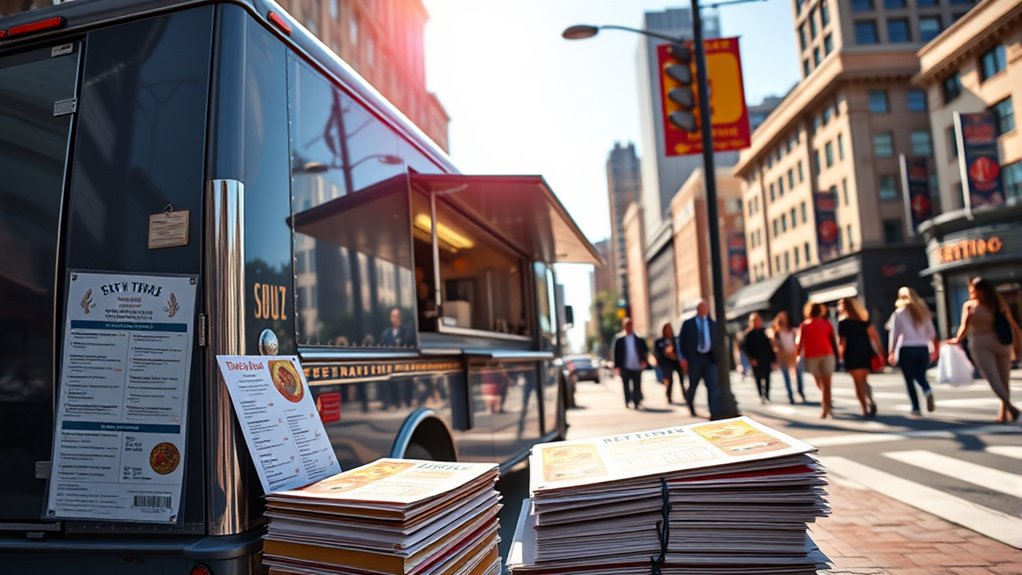
You need a strong branding and promotion plan to stand out in Trenton’s competitive food scene. Engaging with the local community through events and social media can boost your visibility and build loyalty. Focus on connecting authentically with residents to create a lasting impression and grow your customer base. Incorporating beneficial ingredients like fresh, local produce into your menu can also appeal to health-conscious customers and differentiate your food truck from competitors.
Branding and Promotion Strategies
Developing a strong branding and promotion strategy is essential for your food truck’s success in Trenton, where a competitive and diverse food scene demands clear differentiation. Start by creating a consistent brand message that resonates with your target audience, using visual elements like logos, colors, and packaging that reflect your truck’s personality—quirky, rustic, or sophisticated. Craft a compelling story about your food’s origin to foster emotional connections and loyalty. Maintain brand consistency across social media, menus, and your truck’s design to reinforce recognition. Use online marketing efforts like a professional website, engaging social media content, and email newsletters to boost visibility. Offline, collaborate with local businesses, participate in community events, and leverage guerrilla marketing tactics to generate buzz and attract customers. Understanding Your Market can help you tailor your branding efforts to better connect with the younger demographic and high foot traffic areas in Trenton. Additionally, exploring current tableware trends can inspire your presentation and packaging to appeal to modern consumers and enhance the overall dining experience.
Community Engagement Opportunities
Building strong community ties in Trenton can considerably boost your food truck’s visibility and reputation. Partner with local organizations like the Small Business Development Centers to access networking and entrepreneurial support. Engage neighborhood associations and cultural groups by participating in festivals and events. Collaborate with colleges for student discounts or internships, and work with nonprofits on food drives or fundraisers. Joining Trenton’s business chambers or merchant groups enables shared promotions and community impact. Additionally, creating a welcoming atmosphere can be enhanced by incorporating rustic decor, which resonates with the local community and highlights your commitment to the farm-to-table ethos.
Ensuring Continuous Compliance and Inspection Readiness

Maintaining ongoing compliance and inspection readiness requires diligent record-keeping, timely updates, and proactive adherence to all safety standards. You must keep records of fire suppression system inspections, certifications, and fire safety training certificates, readily accessible during inspections. Ensure health permits are current, and all related documentation is organized inside your truck. Pay attention to any changes in your cooking methods or equipment, as these may trigger additional inspections. Always specify your preferred date and time for inspections when scheduling to avoid surprises. Avoid unauthorized ignition of appliances to prevent violations. Regular internal audits help you stay compliant with fire safety codes and health regulations. Staying proactive with documentation, staff training, and operational practices guarantees smooth inspections and continuous compliance, protecting your business and customers. Additionally, maintaining fire safety records and ensuring all equipment is compliant can significantly reduce the risk of violations and improve overall safety standards.
Frequently Asked Questions
How Long Does the Permit Approval Process Typically Take in Trenton?
You’re probably wondering how long the permit approval process takes in Trenton. Typically, it ranges from 30 to 60 days, depending on the specific permits you need, like health, fire, and vendor licenses. To avoid delays, submit your applications at least four weeks early and stay proactive by checking with city departments. This way, you give yourself the best chance for a smooth, timely approval process.
Are There Specific Zoning Restrictions for Food Trucks in Residential Areas?
Isn’t it ironic how neighborhoods meant for peace often block the very businesses that could bring liveliness? In Trenton, zoning restrictions clearly limit food trucks in residential areas, aiming to preserve neighborhood tranquility. You’ll find that operating in these zones requires special permits and approval from the zoning board. Usually, food trucks must stick to commercial or mixed-use zones to avoid penalties, so plan your location carefully.
What Insurance Coverage Is Mandatory for Operating a Food Truck in Trenton?
You need to have certain insurance coverage to operate your food truck legally in Trenton. This includes commercial auto insurance to cover liability and damages from accidents. You also must carry general liability insurance to protect against third-party injuries or property damage, and food liability insurance for claims related to foodborne illnesses. If you have employees, workers’ compensation is mandatory. Optional coverages like business interruption can further safeguard your business.
Can I Operate My Food Truck at Private Events Without Additional Permits?
You can operate your food truck at private events without additional permits if the event is truly private and on private property with permission from the owner. However, if the event is open to the public or on public land, you’ll need proper permits like health and fire safety. Always verify event details and get necessary approvals to stay compliant and avoid fines.
Are There Seasonal or Temporary Licensing Options Available in Trenton?
Think of licensing options like steering a winding river—you might find a seasonal or temporary rapids to pass through. In Trenton, you can explore these options, but they depend on local rules. You’ll need permits, proof of insurance, and zoning approval, with fees from $500 to $1,000. Keep an eye on renewal deadlines and restrictions, ensuring your food truck sails smoothly through seasonal or event-based licenses.
Conclusion
Starting a food truck in Trenton can be a rewarding venture, especially with the city’s growing food scene. Did you know that food trucks generate over $2 billion annually nationwide? By understanding permits, choosing great locations, and creating a compliant menu, you’re setting yourself up for success. Stay on top of inspections and regulations, and your food truck could become a local favorite in no time. Ready to hit the streets? Your culinary journey begins now!
